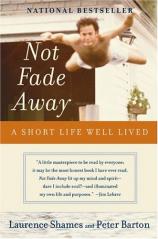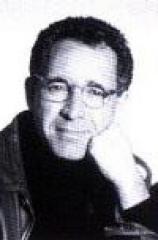Excerpt
Excerpt
Not Fade Away

1
You can tell a lot about a person by his nickname, right?
Mineís Hawk. Iíve had that moniker for as long as I can remember, and it still tickles me. I just love the word. It conjures images of soaring flight against a cloudless sky. It implies a majestic independence, a raptorís uncompromising realism. . . .
Except thatís not the kind of hawk Iím named after.
Iím named after the Studebaker Hawk, a market flop of a sport coupe that was manufactured in the middle 1950s. I just loved the name of the thing. It seemed to summarize all that was cool and jaunty.
Besides, itís really more fitting that I was named after a car. As a kid, I didnít soar, I rode around. I fantasized about automobiles, but what I rode was bicycles or motorized dinghies that I cobbled together from spare parts. Mine was a down-to-earth, nuts and bolts, tinkering kind of childhood.
Then again, kids are always soaring. For them, thereís no boundary between the down-to-earth and the heavenly. Mud is a miracle. Snow is pure chilled joy. A pile of leaves is a sacred altar. Why do we lose that feeling, that sense of wonder, for so much of our lives?
Anyway, I was born in Washington, D.C., but while I was still an infant the family moved to Painted Post, New York, a tiny upstate town complete with maple trees and dappled cows and a beautiful white steeple. And pregnant women! Pregnant women carrying toddlers; pregnant women pushing strollers. There were a million kids to play with. Nice kids, nasty kids, gentle kids, bullies--all of human nature was represented in our little neighborhood.
Our family, in almost every way, was typical. My mother, in those years, was a housewife. My father worked too hard and wasnít around as much as Iíd have liked. We were neither rich nor poor; I donít think I knew those categories existed. Everyone was middle class. Life got better for everyone together. One year there was television, the next year there was color television. One year Dad drove a shiny new Dodge, the next year there was a DeSoto with even bigger tail fins.
Kids donít know from economics, but hereís the lesson I absorbed: Money needed to be worked for but not fretted over. It would appear when required. In the meantime, better to climb trees and build snowmen. In other words, to live.
But I want to tell you about Painted Postís one claim to fame. It is very near the Corning Glass factory, where my father worked.
In case thereís anyone who doesnít remember, Corning did not begin with the fiber optics business. In the 1950s, Corning manufactured plates and platters and Pyrex pans. What the company was best known for, though, was casserole dishes. Everybody had them, remember? Their trademark was an abstract blue flower.
Since my dad worked for Corning, my mom had every casserole shape ever made. We had one for stew. We had one for soup. We had one for potatoes. If theyíd made one for individual spaghetti strands, weíd have had that one too! I can still see the metal cradles that the dishes sat in at the table . . .
But wait--why am I going on about casseroles? I think itís because the approach of death has made me realize that there are no unimportant details in life. That childhood sense of wonder is somehow coming back to me. How can I put it? Things, and the meanings that they have, are being reunited in my heart.
Those old casseroles--maybe theyíre just chipped and battered pans, but for me theyíre connected with incredibly precious things, giant notions like Mother, Kitchen, Family Meals.
So cut me some slack if I get nostalgic now and then over trivialities. The thing is, they donít seem trivial to me. Iíve come to feel that the big things in life are best understood by way of small things. Ignore the small ones, and the big ones just seem like fancy words, slogans without the truth of something you really know, and really feel.
...
Who knows how or when a disease is actually born?
Who knows what cancer is like in its appalling infancy, when the first disastrous cell divisions are just starting to occur, before detection is possible?
For all I know, there may be something beautiful in the process. Under a microscope, in time-lapse, it might look like flowers opening, mushrooms burgeoning. Maybe that sounds creepy--but just because somethingís bad for us, that doesnít mean it canít be beautiful on its own terms. Nature is full of gorgeous and deadly things.
Whatever my diseaseís early history was like, hereís how I first learned of it: My doctor called me on my cell phone.
It is Pearl Harbor Day, December 7, 1998. Iím forty-seven, and Iíve been supposedly ìretiredî for a year and a half. But Iím as busy as Iíve ever been. Iíve started foundations. Iíve been teaching a seminar in business school. I sit on boards of various corporations and advise many friends who are still in mid-career. I feel a joyful obligation to help out where I can. And, to tell the truth, I still love the action.
Today Iím in Silicon Valley, at an informal board meeting at Yahoo. Theyíve asked me to become a director. This is flattering, but I pass--mainly because their business model scares me. How can they actually make money? Thatís what weíre talking about on this particular afternoon: formulating an economic model for a big aggregation of e-commerce businesses. This excites me. What I like is creating things, adding value, shaping the big picture. Iím there to brainstorm, to enjoy the company of some really smart people. And to suggest to them some big ideas--which, I conclude, theyíre not ready for.
What I have to say, basically, is that what Yahoo has done so far is just one piece of a puzzle. Everyone knows their name, but where do they exist, what do they do? Iím telling them they need to become a media company. They need broadcasting. They need content. Theyíve got two choices: become marginal, or go head-to-head with AOL and Microsoft.
At some point the meeting becomes electric. This happens every now and then in business, and when it does, itís an adrenaline rush for sure. It happens when Big Stuff is on the table and people know that the brains and resources are there to do it, if only the will can be found . . .
And thatís when my cell phone rings.
As a matter of policy, I turn my phone off when I go into a meeting. This one time I forgot. And at this crucial moment the damn thing starts buzzing away. Iím slapping at pockets, poking at buttons. I canít get it to stop. Finally I answer, just to make it shut up.
Itís a doctor of mine in Denver. I barely know him. He barely knows me. I donít go to doctors very much. Why would I? Iím a healthy guy, a fitness nut. Iíd gone to see him because I had a little bellyache.
ìMr. Barton?î he says.
ìSpeaking.î
ìI need you to come to my office to discuss this with me. You have cancer.î
Just like that. That terse; that quick; that casual.
I donít remember getting up, but suddenly Iím standing. The Yahoo board of directors is staring at me. Maybe they understand that something bad has happened; maybe theyíre just wondering what could possibly be more important than going head-to-head with AOL.
I leave the meeting. Iím not dizzy, exactly, but out in the hallway the floor doesnít seem quite level, the walls meet the ceiling at a peculiar angle. Iíve still got the doctor on the phone, but he refuses to say much. Itís my life, but weíre doing this his way. He insists he needs to see me in his office.
I head for my plane. On the way, I feel my stomach, pat it down as if searching for a loaded weapon. Somewhere in there--somewhere in me--something poisonous is growing.
This is inconceivable and horribly insulting. It was just a little bellyache that lingered. No shooting pain, no fever. Nothing more than a vague feeling of wrongness in my gut.
It couldnít be cancer. It had to be some grotesque mistake.
Reprinted from NOT FADE AWAY: A Short Life Well Lived by Laurence Shames and Peter Barton © 2003 by Laurence Shames and Peter Barton. Permission granted by Perennial, an imprint of HarperCollins, Inc.
Not Fade Away
- Genres: Nonfiction
- paperback: 224 pages
- Publisher: Harper Perennial
- ISBN-10: 006073731X
- ISBN-13: 9780060737313







